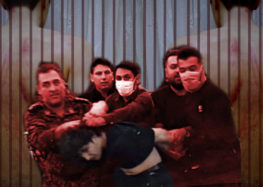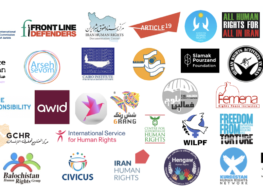Kurdish Activist Facing Prison Time in Iran For Criticizing Supreme Leader
 Kurdish political activist Mokhtar Zarei was summoned and taken into custody in Sanandaj, the capital of Iran’s Kurdistan Province, on July 21, 2018, for criticizing Iran’s Supreme Leader Ali Khamenei in a letter, a close associate informed the Center for Human Rights in Iran (CHRI) on July 25.
Kurdish political activist Mokhtar Zarei was summoned and taken into custody in Sanandaj, the capital of Iran’s Kurdistan Province, on July 21, 2018, for criticizing Iran’s Supreme Leader Ali Khamenei in a letter, a close associate informed the Center for Human Rights in Iran (CHRI) on July 25.
“Mr. Zarei came to court with his lawyer and said ‘detention orders are for those who might escape but I came today with my own two feet and in the past, I have been detained several times and spent time in prison,’” said the source who requested anonymity for security reasons.
“But the judicial official did not agree and they transferred him in handcuffs to Sanandaj Central Prison,” added the source.
In a letter dated March 29, 2018, addressing the supreme leader, Zarei mentioned a litany of human rights violations committed by the state under Khamenei’s watch, adding: “These are just a small portion of Your Excellency’s resume as the ruler. Believe me, the people know a lot more but they cannot talk because they are afraid of being punished and face a terrible fate.”
Zarei, a former member of the Democratic Kurdish Students Union, was first arrested during the winter of 2010 during a memorial ceremony for a Kurdish dissident in Sanandaj. He was released on bail 80 days later.
He was not prosecuted for that case but in March 2014 he was arrested again for posting political comments on Facebook and sentenced to a year in prison for “propaganda against the state” by the Revolutionary Court in Sanandaj. He was released in April 2015.
On June 13, 2018, more than two months after his open letter to Khamenei, the political activist announced that he could be facing new charges.
“After writing my critical letter to the leader, a new case was opened against me,” he said. “I had said in my letter that during the past three decades under his supreme political leadership of Iran, we have witnessed many undemocratic actions, violations of human rights, and denials of freedoms.”
“His least responsibility is providing a response,” added Zarei. “He might be able to convince me with an explanation and tell me that the problems have other reasons, but taking me to court and fabricating charges will not silence me.”
Under Article 514 of Iran’s Islamic Penal Code, “Anyone who, by any means, insults Imam Khomeini, the founder of the Islamic Republic, and/or the supreme leader shall be sentenced to six months to two years imprisonment.”
On March 21, 2018, Khamenei falsely claimed during a speech in the city of Mashhad that no one is punished for criticizing him.
“Some unfair people abuse freedom and say there’s no freedom in the country and then foreigners disseminate their statements in their propaganda,” he said. “Yet there is freedom of thought, freedom of expression and freedom of choice in the country.”






